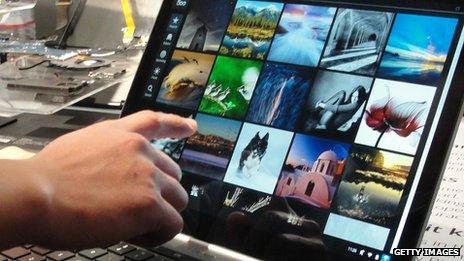Web privacy - outsourced to the US and China?
- Published
- comments

The latest claims will put internet privacy back in the spotlight
Overnight, the Guardian, external and the Washington Post, external have made startling claims about the extent of the US government's surveillance of web communications.
They allege that under a programme called PRISM the intelligence agencies have direct access to the servers of the biggest web firms, including Google, Microsoft, Facebook, Yahoo, Skype and Apple.
Now it must be said that all of the firms have denied any knowledge of this programme, insisting they only hand over data when they receive a subpoena relating to named individuals, rather than offering blanket access.
Facebook, for instance, says it does not provide access to any government organisations, and any requests for information from law-enforcement bodies are dealt with on an individual basis in accordance with the law.
But, unlike yesterday's story about the blanket surveillance of American Verizon customers, these latest revelations will raise concerns outside the US. James Clapper, the US intelligence chief, has sought to reassure the public by saying the web-monitoring operation only targets "non-US persons".
Not much to worry about then, unless you happen to be a citizen of any other country. And then it only matters if you happen to use the services of Microsoft, Yahoo, Google, Facebook, AOL, Skype, YouTube or Apple. Which means just about everyone who has an online presence.
What this highlights is the way we now entrust our data and our privacy almost entirely to American companies, storing it in their "clouds" - vast data centres located in the US. (Skype, which was founded in Europe, is now owned by Microsoft).
They may be rigorous in their control of that data and our privacy rights - or they may feel obliged to cooperate with their government's demands for greater access. It is hard to know the truth.
And it is not only the US which now plays a crucial role in overseeing our communications activities. Yesterday, Britain's Intelligence and Security Committee raised concerns about the key role China's Huawei plays in our telecoms infrastructure.
So our data is with the Americans, while the Chinese control the equipment used to connect our mobile phone calls and broadband.
Now you may or may not be happy about that. I'm of the view that life is too short to worry about whether the FBI is reading my emails, or scanning my Facebook updates, or China's Red Army is listening to my phone calls.
But most people will agree that the privacy and security of our data should be a matter of personal choice, over which we have at least a degree of control. Now it seems that we have outsourced that control to the US and China and unless you want to withdraw from the digital world there is very little you can do about it.